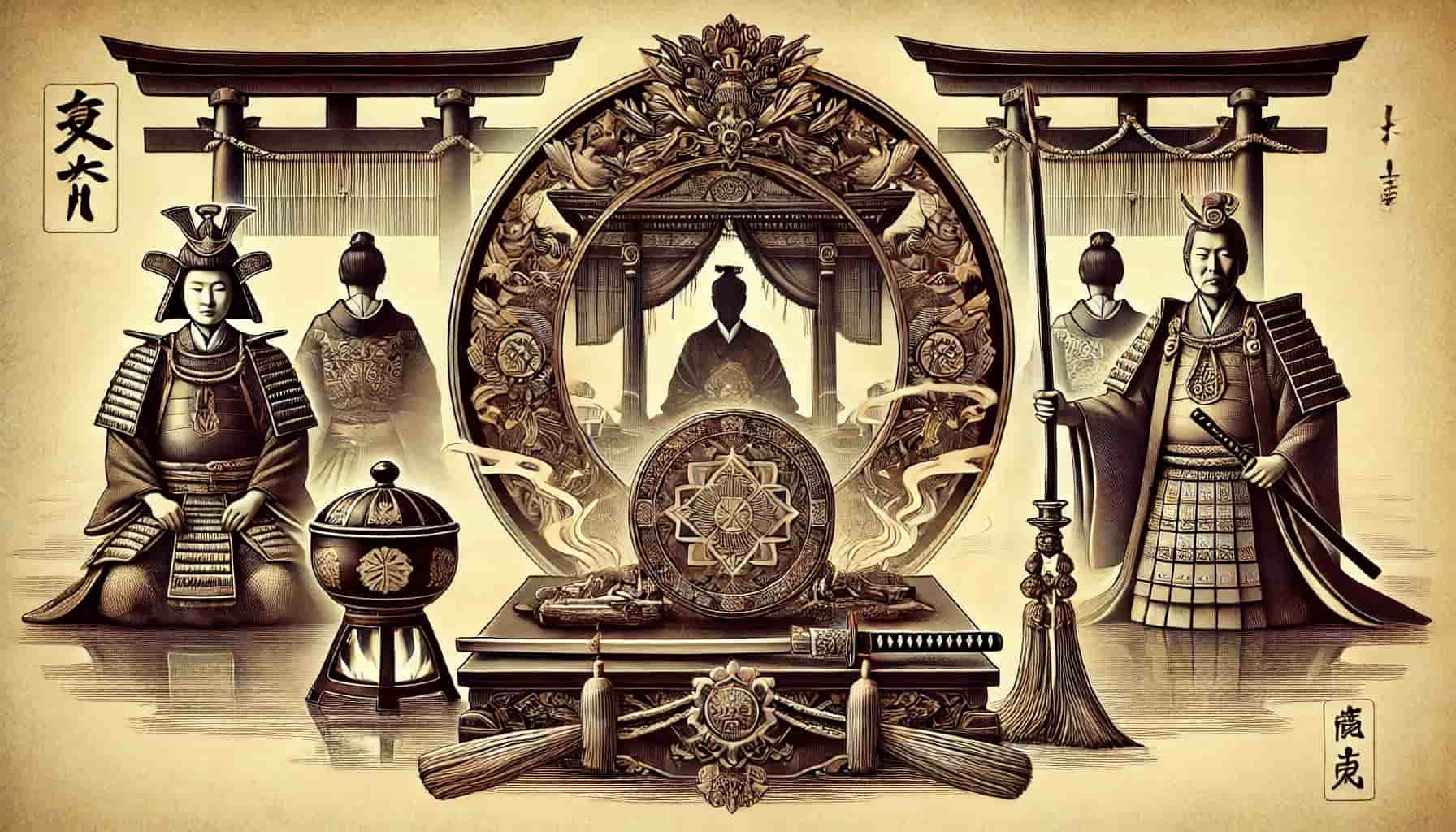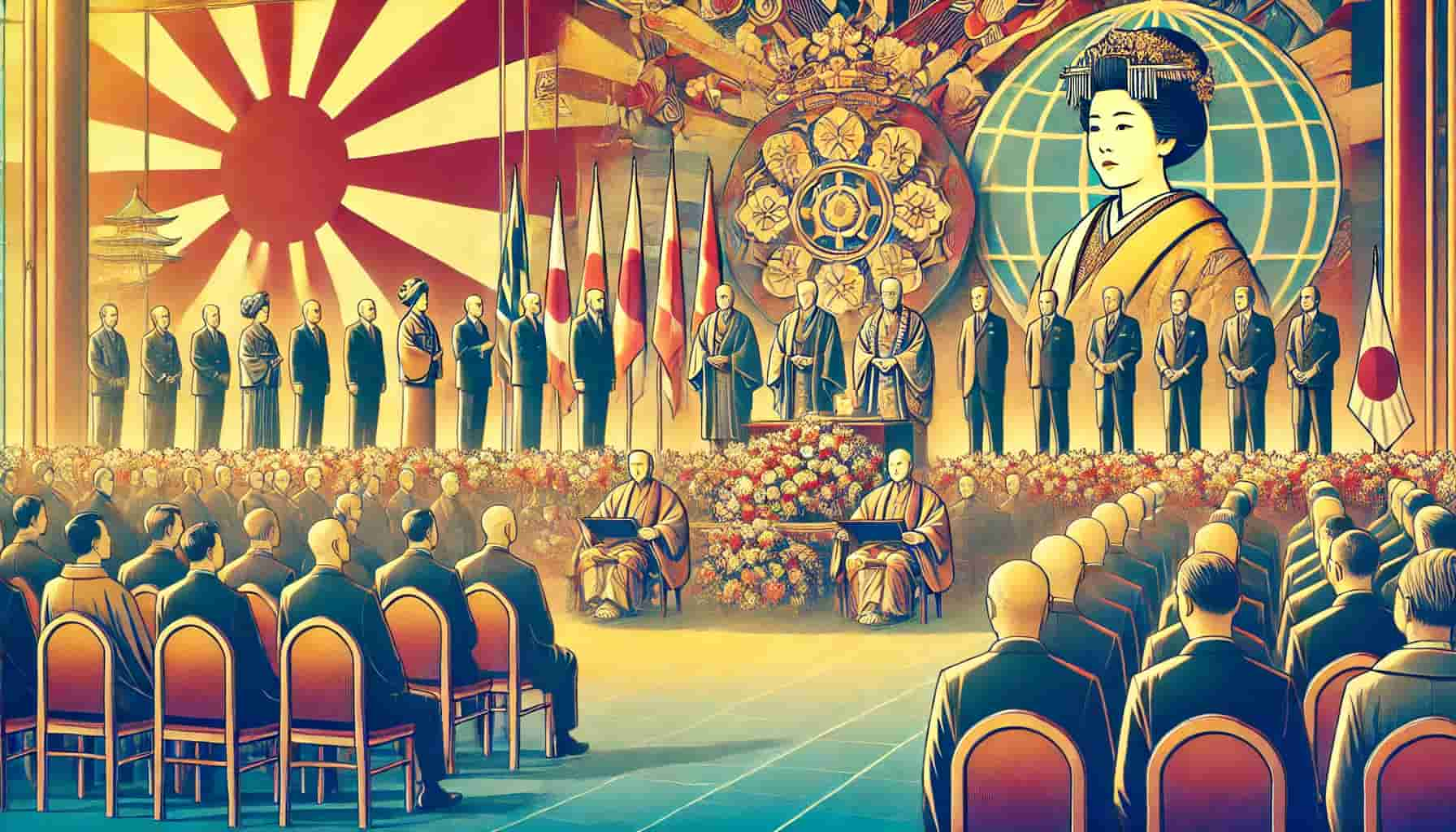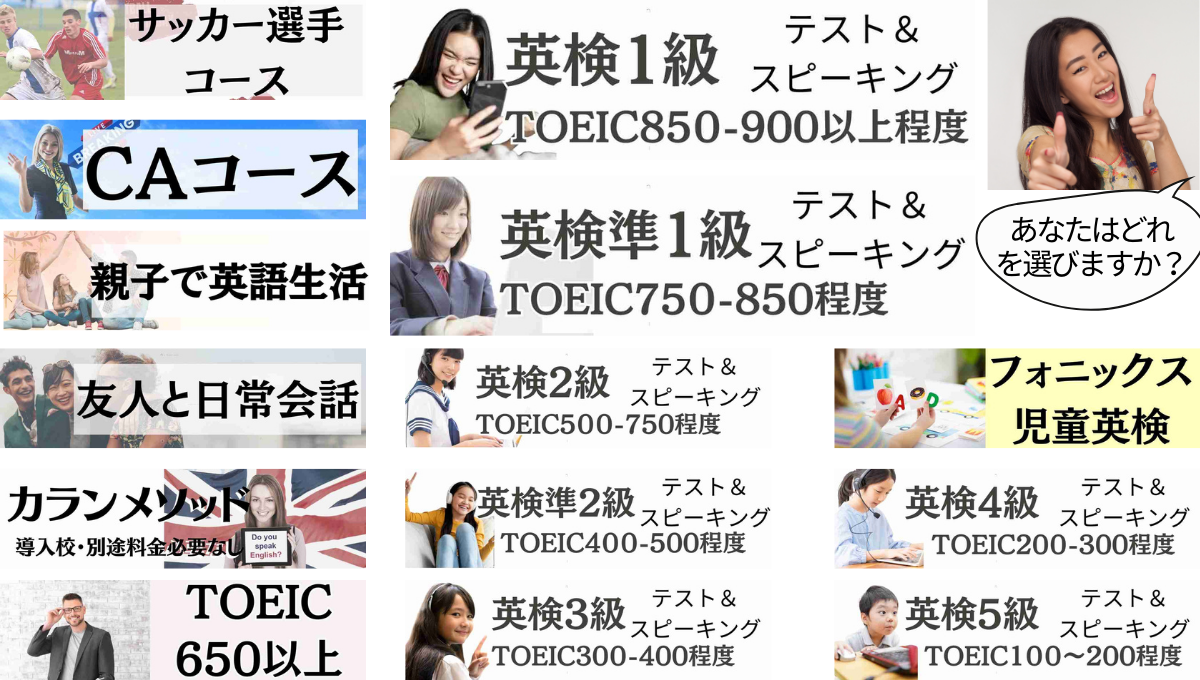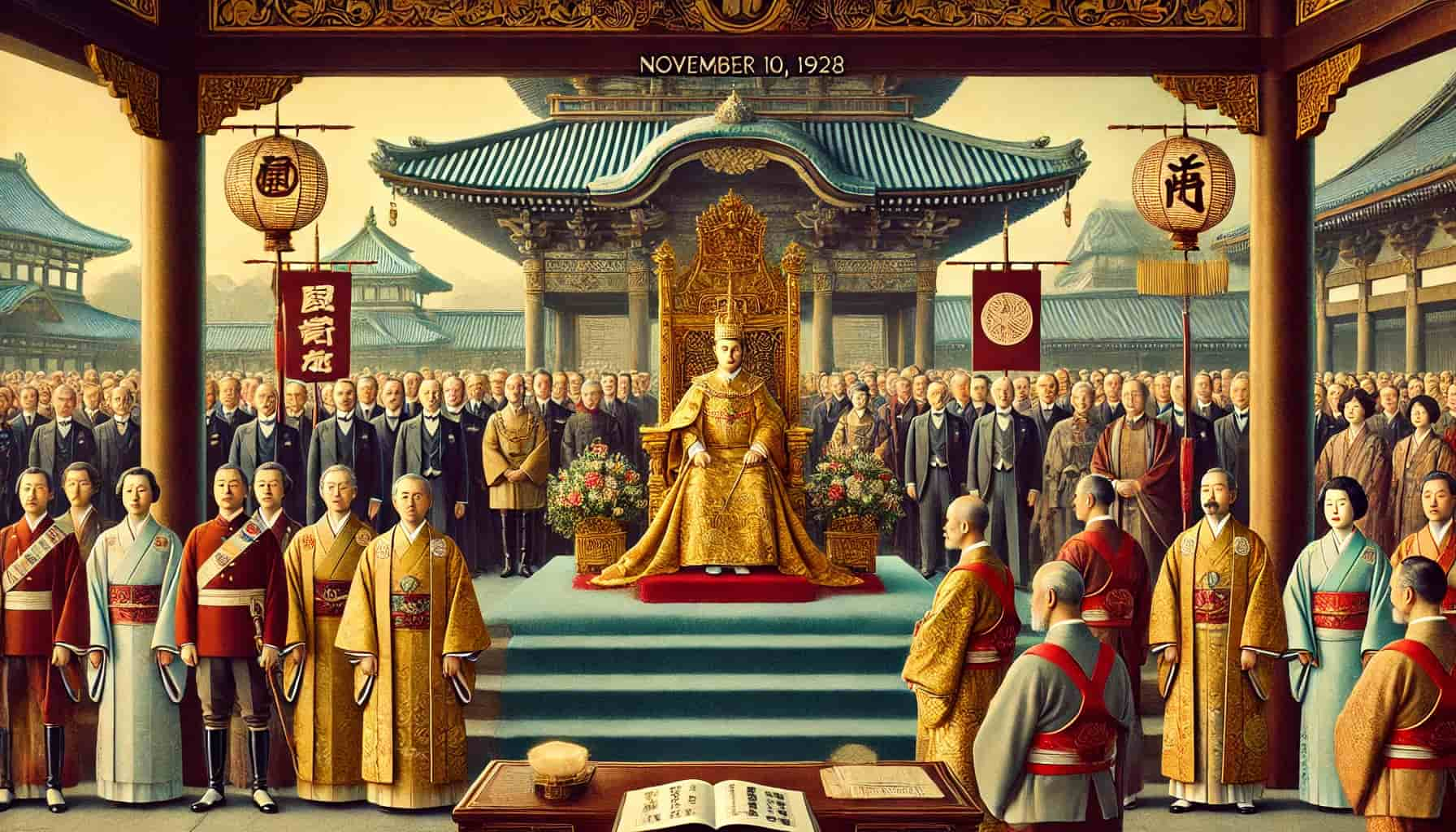The Coronation of Emperor Showa
The theme of this English language resource is "learning casual English through real events."
The theme of this English resource is "Learn casual English through real events."
Section 1: The Coronation of Emperor Showa
On November 10, 1928, Emperor Showa (Hirohito) officially ascended to the Chrysanthemum Throne in Kyoto. This grand coronation was a momentous occasion that drew interest from both domestic and international audiences, showcasing Japan's deep-rooted imperial traditions. The ceremony represented the continuation of Japan's imperial lineage, ensuring that the Chrysanthemum Throne would be "passed down the line" from generation to generation.
Q1: When was Emperor Showa's coronation held?
- A1: Emperor Showa's coronation was held on November 10, 1928.
Q2: What did Emperor Showa's coronation symbolize?
- A2: It symbolized the continuation of Japan's imperial lineage.
Q3: Where did the coronation take place?
- A3: The coronation took place in Kyoto.
Now, let's talk using idioms.
Let the students choose one favorite idiom and make an example sentence.
Idiom: "Passed down the line" Meaning: To be passed from one generation to the next. Example: The tradition was passed down the line, ensuring that it remained a part of the family for generations.
Emperor Showa's Accession to the Throne and American Idioms: History and English Together!
Section 1: Accession of Emperor Showa
On November 10, 1928, Emperor Showa (Hirohito) officially acceded to the throne in Kyoto and ascended the Chrysanthemum Throne. This grand coronation ceremony attracted interest in Japan and abroad, and served as a showcase for Japan's deep imperial traditions. The ceremony symbolized that the Japanese throne is "passed down from generation to generation" and that the imperial lineage will continue from generation to generation.
Questions and Answers
Q1: When was Emperor Showa's coronation ceremony held?
A1: Emperor Showa's coronation ceremony took place on November 10, 1928.
Q2: What did Emperor Showa's coronation ceremony symbolize?
A2: It symbolized the continuation of the Japanese imperial lineage.
Q3: Where was the coronation ceremony held?
A3: The coronation ceremony took place in Kyoto.
Idiom: "Passed down the line"
meaning: To be passed down from generation to generation.
Example: "The tradition was passed down from generation to generation and remained part of the family for generations to come."
Section 2: Cultural Significance of the Coronation

The coronation of Emperor Showa was more than just a political event; it was a cultural milestone that reflected Japan's rich traditions and beliefs. The sacred regalia, including the mirror, sword, and jewel, played a key role in emphasizing the divine connection between the emperor and Shintoism. This ceremony was a clear indication that Japan intended to "keep one foot in the past"While also moving toward modernization, blending tradition with progress.
Q1: What role did the sacred regalia play in the coronation?
- A1: The sacred regalia emphasized the divine connection between the emperor and Shintoism.
Q2: What does the coronation reflect about Japan?
- A2: It reflects Japan's intention to honor tradition while embracing modernization.
Q3: How did Japan balance tradition and progress during the coronation?
- A3: Japan balanced tradition and progress by keeping one foot in the past while moving toward modernization.
Now, let's talk using idioms.
Let the students choose one favorite idiom and make an example sentence.
Idiom: "Keep one foot in the past" Meaning: To respect and maintain traditions while also embracing new changes. Example: The family decided to keep one foot in the past by celebrating traditional holidays while also adapting to modern customs.
Section 2: Cultural Significance of the Accession Ceremony
The enthronement ceremony of Emperor Showa was not merely a political event, but also a cultural milestone that reflected the rich traditions and beliefs of Japan. The three sacred sacred artifacts - the mirror, sword, and jade - played an important role, underscoring the sacred connection between the emperor and Shintoism. The ceremony demonstrated Japan's commitment to modernization, blending tradition and progress while "keeping one foot in the past.
Questions and Answers
Q1: What are the roles of the sacred three sacred objects in the coronation ceremony?
A1: The three sacred objects emphasized the sacred connection between the emperor and Shintoism.
Q2: What does the coronation ceremony reflect about Japan?
A2: It reflects Japan's commitment to modernization while respecting its traditions.
Q3: How did Japan combine tradition and progress in the coronation ceremony?
A3: Japan has managed to combine tradition and progress by moving toward modernization while keeping one foot in the past.
Idiom: "Keep one foot in the past"
meaningThe goal is: to continue to respect traditions while embracing new changes.
Example: "That family has one foot in the past by celebrating traditional holidays while also adapting to modern customs."
Section 3: International Reactions

Many international representatives and diplomats attended Emperor Showa's coronation, highlighting Japan's growing The event was a chance for Japan to "roll out the red carpetThe congratulatory messages from foreign nations underscored the friendly relations Japan was fostering and its desire to be recognized as a modern, cooperative nation. The congratulatory messages from foreign nations underscored the friendly relations Japan was fostering and its desire to be recognized as a modern, cooperative nation.
Q1: Who attended Emperor Showa's coronation?
- A1: Many international representatives and diplomats attended.
Q2: What did the coronation signify for Japan's international status?
- A2: It signified Japan's growing presence on the world stage.
Q3: How did Japan present itself during the coronation?
- A3: Japan rolled out the red carpet to showcase its cultural richness and diplomatic aspirations.
Now, let's talk using idioms.
Let the students choose one favorite idiom and make an example sentence.
Idiom: "Roll out the red carpet" Meaning: To give special treatment or show hospitality, often to important guests. The city rolled out the red carpet for the visiting dignitaries, hosting a grand welcoming ceremony.
Section 3: International Reactions
Many international representatives and diplomats attended Emperor Showa's coronation ceremony, demonstrating Japan's growing international standing. The event was an occasion for Japan to "roll out the red carpet" and demonstrate its cultural richness and diplomatic aspirations. Congratulatory speeches from foreign countries underscored Japan's desire to build friendly relations and be recognized as a modern, cooperative nation.
Questions and Answers
Q1: Who attended Emperor Showa's coronation ceremony?
A1: Many international representatives and diplomats attended.
Q2: What did the coronation ceremony mean for Japan's international standing?
A2: It meant Japan's growing international status.
Q3: How did Japan introduce itself at the coronation ceremony?
A3: Japan rolled out the red carpet and demonstrated its cultural richness and diplomatic aspirations.
Idiom: "Roll out the red carpet"
meaning: To show special treatment and welcome to important guests.
Example: "The city rolled out the red carpet for the visiting dignitaries and held a grand welcoming ceremony."



Disclaimer:
This English language material is based on content generated using ChatGPT with modifications. While every care has been taken to ensure the accuracy of the information, it may contain errors. We are not responsible for any damages caused by the use of this material.



